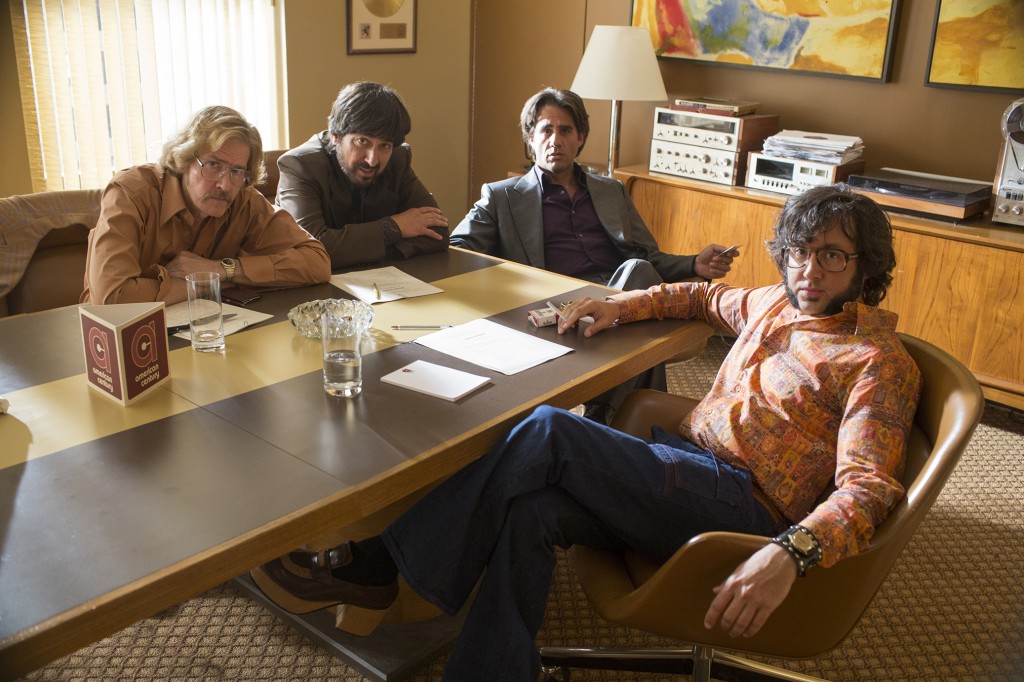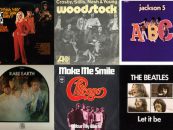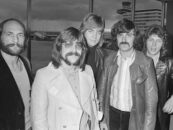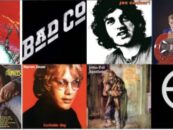New series rides the highs & lows of the ’70s rock music game
P.J. Byrne thinks the white powder he put up his nose was vitamin B. J.C. MacKenzie is pretty sure the stuff he was snorting during his scene on a private jet was flour. They’re both certain it was not cocaine.
Such was part of our chat in Boston at the Revere Hotel, after an early February, invite-only screening of the two-hour pilot for HBO’s new series Vinyl, premiering on Sunday (February 14th). The two actors were there representing it. Byrne plays Scott Levitt, attorney and junior partner at American Century Records. MacKenzie plays Skip Fontaine, head of sales and main partner with Richie Finestra, the manic-depressive founder and president of American Century, played by the ever-excellent Bobby Cannavale.
It’s not quite Blow or Scarface, but it sure snows a lot in the 1973-set rock ‘n’ roll/music biz series helmed by Martin Scorsese, Mick Jagger and Terence Winter (The Sopranos, Boardwalk Empire). In the first of its initial 10 episodes, the show begins with Finestra sitting in his car in a bad part of New York City, clearly in a dejected state. He wants to buy an eight-ball of coke from a street dealer, but then curses fate and decides to up his purchase to a quarter ounce. Fueled by the Bolivian marching powder – as novelist Jay McInerney would dub it about a decade later – he catches a whiff of something wild, and joins a flock of young people heading into the Mercer Arts Center.
It’s 1973 and the toast of New York underground bands, the New York Dolls, is on-stage ripping it up with “Personality Crisis.” The front man, singer David Johansen, is pouting, preening and pirouetting and my jaw dropped. Christian Peslak, as the young Johansen, could be a young Johansen’s clone. He’s that spot-on.
The music? It sounded like the Dolls’ original music with Peslak lip-synching. (I asked HBO about it and they said it was David Johansen singing, but it’s a re-recorded version.) Scorsese has the best sense of any director today for fusing rock music into the narrative, whether it’s meant to be complementary or the primary focus. To say he’s in his wheelhouse here would be an understatement.
Vinyl is not all fun and games. But there’s a lot of fun watching the games being played – many of them nasty and nefarious. Of course, the first thing any rock critic thinks when approaching cinematic rock is veracity: Does this seem real? Does it rock? The New York Dolls scene suggests it does and it will. You can feel the texture, the visceral rawness.
Throughout Vinyl real bands – the music and the physical representation of them – mix with fictional bands – or at least the band fronted by Kip Stevens (played by Mick Jagger’s son, James Jagger) called Nasty Bits. (In future episodes, you’ll see “David Bowie” and “Iggy Pop,” among others.)
(If you’re a new Best Classic Bands reader, we’d be grateful if you would Like our Facebook page and/or bookmark our Home page.)
On Sunday, you’ll hear snippets of hits like Led Zeppelin’s “Whole Lotta Love,” Mott the Hoople’s “All the Way from Memphis” and Edgar Winter’s “Frankenstein,” but you’ll also get lots of era-defining music outside the mainstream. Most notably, a good chunk of Slade’s “Mama Weer All Crazee Now,” a stomping U.K. glam-rock hit, but a non-starter in the U.S. But it’s a party-hearty rocker that perfectly conveys the frenzy of the biz, the bands, the fans and the times.
We’re in the pre-punk or proto-punk time zone, but there’s Finestra’s back story, too, about his early involvement with the record industry (and the mob) back in the early ‘60s. His friend and protégé is a gritty R&B/soul singer named Lester Grimes (Ato Essandoh), who’s being remade, against his will, into a more radio-friendly version named Little Jimmy Little. (Singing voice provided by Vintage Trouble’s Ty Taylor.)
But in 1973, it’s Nasty Bits who might just be on the way up. They’re a Stooges/Sex Pistols-ish band with a primitive style and an anti-American sneer. They create chaos in clubland – bottles hurled at them, fights breaking out. The confrontation fires the music and vice versa. Jagger is terrific as Kip Stevens, the disaffected punk who can barely name three things he’s interested in – “fighting… fucking… nothing.”
He tells this to A&R assistant Jamie Vine (played by film and rock video director Julien Temple’s daughter, Juno) who sees Stevens as a hookup and the Nasty Bits as her way up the ladder.
Said MacKenzie in Boston: “During the first read-through I didn’t know that was Jagger’s son. I thought, ‘Wow, where’d they get that kid from fucking Britain? He’s great!’”
But Vinyl is not just about music, it’s about the business of music, the interlocking (or clashing) of the art and the commerce, which is to say, as AC/DC once sang, there are plenty of dirty deeds done dirt cheap. Books are cooked, payola (or drugola) is doled out and careers – among other things – are crushed. There is a vibe of surface camaraderie, but an undercurrent of avarice.

HBO’s Vinyl “The King and I” episode. J.C. MacKenzie as Skip Fontaine, Ray Romano as Zak Yankovich, Bobby Cannavale as Richie Finestra, P.J. Byrne as Scott Levitt. Photo: Paul Schiraldi/HBO.
We gather that the late ‘60s and early ‘70s were heady times for American Century, but the future does not look bright and it may be bought by PolyGram, a German-led conglomerate. This does not sit well with some of the people at the label, still holding over, shall we say, some resentment from World War II. (There’s a darkly comic, awkward scene at a conference table as the Germans and Americans talk. I don’t want to spoil any punchlines. I will say when you hear the killer line from Byrne, he told me it was his ad-lib and Scorsese liked it so much he kept it.)
What we’re seeing in Vinyl is exhilaration walking hand-in-hand with greed and degradation.
The kernel of the idea for Vinyl came from Mick Jagger in the mid-‘90s. He brought it to Scorsese and they began collaborating on a potential movie, but nothing came to fruition. Winter was brought in in 2008, to make it into a long-form television series, and act as showrunner. It began shooting in New York City during the summer of 2014. It’s early, but Vinyl, with its multiple characters and interlocking subplots, may remind you of the previous Scorsese-Winter collaboration, Boardwalk Empire. And it may have the same kind of multi-season legs.
One of the main real figures in Vinyl is Led Zeppelin’s beastly, control freak of a manager Peter Grant. He creates a major ruckus, as he was wont to do, when it appears Finestra and his company has screwed the band on royalty rates. (Led Zeppelin was, of course, with Atlantic Records.) Finestra, too, can go on quite a rampage, a la Leonardo DiCaprio in the Scorsese-Winter film The Wolf of Wall Street.
There’s a lot of exacting damage done to people, objects and edifices. There’s enough inside baseball and black humor to keep any fan enticed, the best being Andrew Dice Clay’s over-the-top, out-of-control coke-fueled romp as radio kingpin Frank “Buck” Rodgers.
I recently spoke with Ben Liemer, who hit the New York club scene as a fan in 1974. He later worked at the trade magazine Record World, and in the ’80s became managing editor at one of the top rock magazines of the day, Circus. He was also cast as an extra – a record executive – on Vinyl.
“It’s about time someone got it right,” says Liemer, of the rock terrain Vinyl explores. “It’s not that easy to capture. It felt so real I can’t tell you.”
- J. Geils Talks About His Former Band: Last Interview - 04/11/2024
- 10 Unusual and Surprising Cover Songs - 03/30/2024
- ‘1971’ Book Makes a Strong Case for Best Rock Year - 03/28/2024







1 Comment so far
Jump into a conversationHow much Payola did you get to write this review? This may be one of the worst steaming piles ever to air on HBO and is so WRONG on every level its hard to know where to even begin. but i will begin with this. How is a brit with short hair fronting whats seemingly a 1979 second generation punk band in New York City in 1973 ?